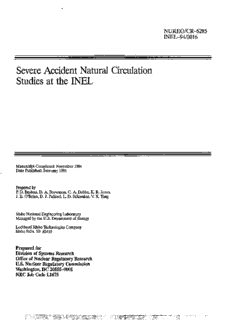
Severe Accident Natural Circulation Studies at the INEL PDF
Preview Severe Accident Natural Circulation Studies at the INEL
Severe Accident Natural Circulation Studies at the INEL Manuscript Completed: November 1994 Date Published: February 1995 Prepared by P. D. Bayless, D. A. Brownson, C. A. Dobbe, K. R. Jones, J. E. O'Brien, D. J. Pafford, L. D. Schlenker, V. X. Tung Idaho National Engineering Laboratory Managed by the U.S. Department of Energy Lockheed Idaho Technologies Company Idaho Falls, ID 83415 Prepared for Division of Systems Research Office of Nuclear Regulatory Research U.S. Nuclear Regulatory Commission Washington, DC 20555-0001 NRC Job Code L1675 DISCLAIMER This report was prepared as an account of work sponsored by an agency of the United States Government. Neither the United States Government nor any agency thereof, nor any of their employees, make any warranty, express or implied, or assumes any legal liability or responsibility for the accuracy, completeness, or usefulness of any information, apparatus, product, or process disclosed, or represents that its use would not infringe privately owned rights. Reference herein to any specific commercial product, process, or service by trade name, trademark, manufacturer, or otherwise does not necessarily constitute or imply its endorsement, recommendation, or favoring by the United States Government or any agency thereof. The views and opinions of authors expressed herein do not necessarily state or reflect those of the United States Government or any agency thereof. DISCLAIMER Portions of this document may be illegible in electronic image products. Images are produced from the best available original document. ABSTRACT Severe accident natural circulation flows have been investigated at the Idaho National Engineering Laboratory to better understand these flows and their poten tial impacts on the progression of a pressurized water reactor severe accident. Parameters affecting natural circulation in the reactor vessel and hot legs were identified and ranked based on their perceived importance. Reviews of the scaling of the 1/7-scale experiments performed by Westinghouse were undertaken. RELAP5/MOD3 calculations of two of the experiments showed generally good agreement between the calculated and observed behavior. Analyses of hydrogen behavior in the reactor vessel showed that hydrogen stratification is not likely to occur, and that an initially stratified layer of hydrogen would quickly mix with a recirculating steam flow. An analysis of the upper plenum behavior in the Three Mile Island, Unit 2 reactor concluded that vapor temperatures could have been sig nificantly higher than the temperatures seen by the control rod drive lead screws, supporting the premise that a strong natural circulation flow was likely present dur ing the accident. SCDAP/RELAP5 calculations of a commercial pressurized water reactor severe accident without operator actions showed that the natural circulation flows enhance the likelihood of ex-vessel piping failures long before failure of the reactor vessel lower head. FIN LI675—Natural Circulation in PWRs During Severe Accidents. NUREG/CR-6285 in CONTENTS ABSTRACT iii LIST OFFIGURES vii LIST OFTABLES vii EXECUTIVE SUMMARY ix ACKNOWLEDGMENTS xiii ACRONYMS xv 1. INTRODUCTION 1 1.1 Description of Natural Circulation Flows 1 1.1.1 In-Vessel Natural Circulation 3 1.1.2 Hot Leg Countercurrent Flow 4 1.1.3 Coolant Loop Flow 7 1.2 Importance of Natural Circulation Flows 7 1.3 Description of Scenarios Leading to Natural Circulation 8 2. PHENOMENA IDENTIHCATION AND RANKING TABLES 10 2.1 In-Vessel Natural Circulation 11 2.2 Hot Leg Natural Circulation 12 2.3 Interpretation of Results 14 3. EXPERIMENTS AND SEPARATE EFFECTS ANALYSES 16 3.1 Westinghouse U-Tube Steam Generator Experiments 16 3.1.1 Experiment Description and Results 16 3.1.2 Experiment Scaling 17 3.1.3 RELAP5/MOD3 Experiment Calculations 19 3.2 Natural Circulation Flow Disruption 19 3.2.1 Upper Plenum Hydrogen Stratification and Mixing 19 3.2.2 Hydrogen Blocking of the Steam Generator Tubes 20 3.3 Natural Circulation in the TMI-2 Accident 21 4. COMMERCIAL PLANT ANALYSES 23 4.1 Surry Calculations 23 v NUREG/CR-6285 4.1.1 Modeling Natural Circulation Hows 23 4.1.2 Analysis Results 25 . 4.2 Related Plant Analyses 27 4.3 Extension of Results to Other PWRs 28 5. SUMMARY AND CONCLUSIONS 30 6. REFERENCES 31 Appendix A—Natural Circulation Parameter Importance Evaluation A-l Appendix B—Scaling Review of the Westinghouse Test Apparatus and Natural Circulation Experiments B-l Appendix C—Reevaluation of Scaling Considerations for the Westinghouse 1/7-Scale PWR Experiments C-l Appendix D—RELAP5 Analysis of Natural Circulation Flow in the Westinghouse High-Pressure SF6 Experiments D-l Appendix E—Effects of Hydrogen Generation on Severe Accident Natural Circulation E-l Appendix F—Evaluation of the Capability of RELAP5/MOD3 to Calculate Hydrogen Blockage Effects in U-Tube Steam Generators F-l Appendix G—Examination of the Lead Screw Temperatures in the Upper Plenum of TMI-2 G-l Appendix H—Evaluation of Heat Transfer Uncertainties for Hot Leg Natural Circulation H-l Appendix I—Plant Categorization Based on the Potential for Unintentional Depressurization Resulting from Failure of Ex-Vessel Components 1-1 NUREG/CR-6285 vi LIST OF FIGURES 1. Severe accident natural circulation flows 2 2. Hot leg natural circulation stream flows 5 3. Typical nodalization of the hot leg and steam generator for SCDAP/RELAP5 calculations with hot leg natural circulation 24 4. Nodalization of the reactor vessel for the Surry SCDAP/RELAP5 calculations with in-vessel natural circulation 26 LIST OF TABLES 1. Priority rankings for in-vessel natural circulation phenomena 12 2. Priority rankings for hot leg natural circulation phenomena 13 vii NUREG/CR-6285
Description: